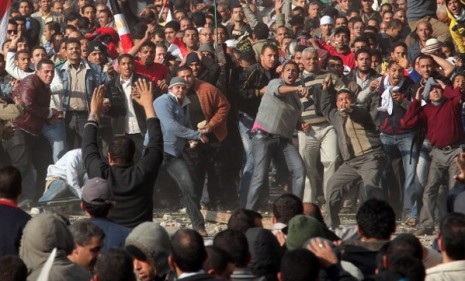Egypt: What the violence means
Supporters of embattled Egyptian President Hosni Mubarak have emerged to fight with anti-government protesters. What's next for the uprising?

Anti-government demonstrators regrouped in Tahrir Square in Cairo on Thursday, despite renewed clashes with supporters of President Hosni Mubarak and overnight violence that left several dead and more than 800 wounded. Soldiers stepped in to separate the opposing factions, and the newly appointed prime minister, Ahmed Shafiq, publicly apologized "for everything that happened," saying the attacks on the protesters were "neither logical nor rational." Though Mubarak has already promised that neither he nor his son will run in the fall elections, President Obama is calling for an immediate transition to a more open government. Is the bloodshed a sign that the old regime has more fight left in it than people thought? (See scenes from the violence)
Mubarak does not plan to go quietly: The violence "appears to be Hosni Mubarak's answer to demands that he leave office immediately," says Ed Morrissey in Hot Air. Mubarak might be trying to force the army "off the sidelines" and onto his side, but he's playing "a dangerous game." The "leaders on the streets" have less to lose in a violent free-for-all, which could "easily" turn "what had been a pro-democracy push" into "a radical Islamist putsch."
"Egyptian protests turning violent"
The Week
Escape your echo chamber. Get the facts behind the news, plus analysis from multiple perspectives.

Sign up for The Week's Free Newsletters
From our morning news briefing to a weekly Good News Newsletter, get the best of The Week delivered directly to your inbox.
From our morning news briefing to a weekly Good News Newsletter, get the best of The Week delivered directly to your inbox.
The forces of change will not back down: "It's clear that the Egyptian regime will try to bludgeon or divert the popular movement" into submission, says Seumas Milne in Britain's Guardian. But the people have "seen and felt" their own power, and they won't be "scared" by thugs into backing down. They won't settle for anything but "radical change" — Mubarak's maneuvers, "choreographed" by Washington, won't do. "Whatever now happens, the forces that have been unleashed, in Egypt and beyond, cannot be turned back."
"The forces unleashed in Egypt can't be turned back"
The army remains on the fence: Egypt's military has been "the invisible power behind the throne since the officers' coup of 1952 overthrew the British-backed monarchy," say Roula Khalaf and Daniel Dombey in the Financial Times (registration required). The army won the anti-government protesters' trust by "describing their demands as 'legitimate,'" but its interests are "deeply entrenched within the regime." Now, by letting pro-Mubarak mobs attack the peaceful anti-government protesters, the army showed that it hasn't decided whose side it's on.
"Egyptian army loyalties torn"
A free daily email with the biggest news stories of the day – and the best features from TheWeek.com
-
 Political cartoons for February 1
Political cartoons for February 1Cartoons Sunday's political cartoons include Tom Homan's offer, the Fox News filter, and more
-
 Will SpaceX, OpenAI and Anthropic make 2026 the year of mega tech listings?
Will SpaceX, OpenAI and Anthropic make 2026 the year of mega tech listings?In Depth SpaceX float may come as soon as this year, and would be the largest IPO in history
-
 Reforming the House of Lords
Reforming the House of LordsThe Explainer Keir Starmer’s government regards reform of the House of Lords as ‘long overdue and essential’